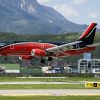 All indications, backed up by official reports and statements from aviation experts, point to a scenario many airlines and passengers have become increasingly familiar with since the dawning of the pandemic; inadvertent flight disruptions. The question that many would probably ask is how and why this is happening. Is it a question of unanticipated operational issues such as pilot shortages, bad weather, grounded planes causing aircraft shortages, grounded crews, or ongoing aviation restrictions due to the coronavirus?
All indications, backed up by official reports and statements from aviation experts, point to a scenario many airlines and passengers have become increasingly familiar with since the dawning of the pandemic; inadvertent flight disruptions. The question that many would probably ask is how and why this is happening. Is it a question of unanticipated operational issues such as pilot shortages, bad weather, grounded planes causing aircraft shortages, grounded crews, or ongoing aviation restrictions due to the coronavirus?
Since the last spring and partially into the summer season, many airlines have been trying to add more flights to their schedules in an effort to balance the increasing passenger demand. Eurocontrol has estimated a 6% increase in air traffic in Europe by December 2022 from the current 90% figure due to the increasing passenger demand. An increase in air traffic would mean more operational challenges in major airports, increasing the risk of disrupted flights.
According to data by Flight Aware, Lufthansa Group, a leading airline in Europe, reported 33,000 canceled flights in January and February this year, following an optimistic fall 2021 season. This figure represents approximately 10% of all flights the airline cancelled from its winter schedule. Experts say that the scenario will likely replicate in many airlines in the coming months.
Delta Airlines canceled 4% of its operations on the memorial day weekend according to Flight Aware data. On 9th June this year, unionized employees at Charles de Gaulle Airport in Paris went on strike leading to cancellation of a third of the flights.
Seemingly, the increased flight disruptions that many airlines are experiencing today stem from a hazy mix of operational issues, which calls for a strategic response to mitigate their adverse outcomes on the aviation industry.
First off, the issue of inclement weather has played a significant role in the operational challenges that many airlines are currently struggling with. Usually, bad weather conditions force airlines to reschedule thousands of flights and, in the worst-case scenario, ground planes and crews altogether. For example, Storm Eunice, which occurred in February 2022, forced major European carriers like British Airways to reschedule more than 80 flights, including 36 flights at London City and 44 commercial flights to and from Heathrow. Such unexpected weather events have a cascading effect on flight operations, which, if not addressed, may result in a logistical stalemate.
The reality is that aviation companies are still grappling with employee shortages, especially airport pilots who undertake lengthy training programs and can only qualify to fly a specific aircraft at a given time.
Boeing projects that European carriers will need to recruit about 95,000 pilots to meet the increasing demand for commercial pilots by 2034. This translates to 5,000 newly recruited pilots each year. As of now, many airlines are dealing with a logjam in training and certifying pilots to satisfy this increasing demand. If anything goes haywire, it is unlikely that any of these airlines would get themselves out of the predicament.
To some, the travel chaos observed in many airports has resulted from a shortage in ground handlers and air traffic controllers, and not necessarily, an issue of low pilot supply. For example, Swissport International Limited has lost over a third of its workforce since the pandemic, resulting to a severe staff shortage problem. Markedly, the rate of return and callbacks for laid-off staff does not commensurate with the pent-up demand for passenger air travel, leading to chaotic flight schedules.
Presently, Wizz Air employs slightly over 6,000 employees from about 4,000 employees pre-COVID, yet they are still forced to cancel flights. In their view, the shortage of ground workers and air traffic controllers has made it challenging to attain the “standard & dash” requirements for a fully operational supply chain.
The remarkable growth in air cargo aviation, turbocharged by the ongoing COVID-19 pandemic, has also contributed to the operational challenges that have caused widespread disruptions in the aviation sector. According to IATA, European carriers reported a 2.2% increase in cargo aviation in February 2020 compared to the figure reported in February 2021. The pandemic created business opportunities for air cargo services but concomitantly exposed a lot of deficiencies in cargo handling, leading to disrupted cargo flights and increased delays.
Even with the easing of COVID-19 restrictions, some airlines, most notably low-cost carriers, have struggled with a string of other problems that have made it difficult to maintain regular flight schedules. For example, EasyJet with nearly the same number of employees as it did in 2019, has announced plans to cancel over 200 flights due to shortages in ground staff and IT-related problems, disrupting air travel on its major flight routes.
While many passengers consider flight disruptions an inconvenience that is out of their control, they can still do something to help themselves and reduce the damage. One way to deal with such problems is by planning their travel schedules to ensure they have buffer time to adjust in case of unexpected turbulence and flight delays. Other than that, airline companies should address uncertainties that expose them to an increased risk of disrupted flights and turbulences that result in destabilized flight schedules.





